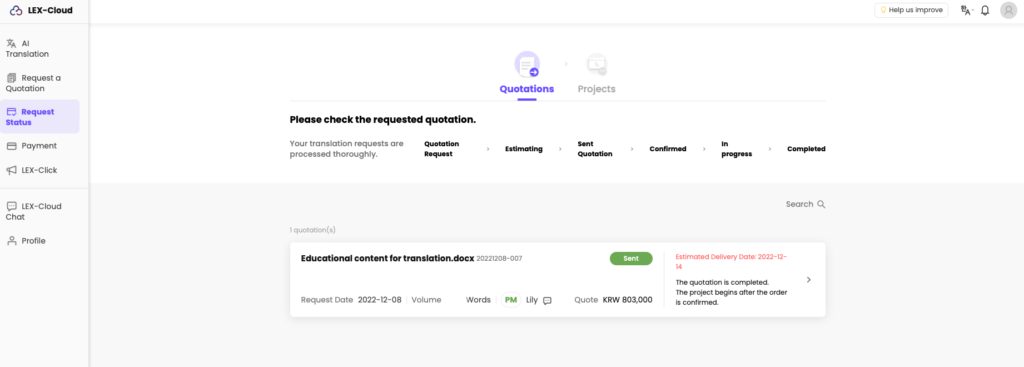All right. You may be raising your eyebrows at what a CEO has just claimed about his own product. As some of us may know, even a hedgehog will eat its babies. They’d know, of all creatures, how to deal with their offspring as their “bosses,” and there are some things they’re more cautious about because they’re responsible for all the consequences.

AI “DALL-E” created a “baby-loving hedgehog” in 10 seconds
In this article, I’ll try to explain, as direct as possible, why you should leave all your translation needs to Lexcode. Please read on and make your own final decision.
1. Price
Translation is probably the hardest to price because there is no such thing as an “industry-standard price.” Some companies have published prices, but most require you to send them your files before you get an actual quote.
In this case, you can connect to LEX-Cloud*, upload your files directly, and get an instant estimate. You don’t need to sign up or log in for a quote. As it follows a predetermined logic, it won’t change on the fly. The file will stay in the cloud server’s cache for a while before disappearing, so your document won’t be compromised. It’s not a very accurate estimate, given the specifics of each document, but expect to get a good ballpark figure for comparison purposes.
*Lexcode is the company’s name, and LEX-Cloud is the name of its platform for localization. I recommend you check out the links below to experience it yourself.
[Click] Translation quotes in 30 minutes; order now from LEX-Cloud!
For reference, if you’re looking at price alone, Lexcode is average to slightly above average. So, if cost is your only criterion, there’s no reason to choose Lexcode, at least until you finish reading below.
2. Quality
Until relatively recently, the way translation companies and building contractors worked was not that different. When a construction company receives a request for a building project, it hires laborers for each phase of the project. Yet, the laborers on site are rarely regular employees of the construction company. Likewise, translation companies hire freelance translators to work for them. This is where the difference in quality comes in.
There is no “cheap and skilled” labor in a free labor market. There may be cheap products (by increasing the efficiency of production facilities), but there is no “cheap labor.” A construction company that receives a low bid for a building will naturally find it difficult to hire skilled labor. They’ll hire unskilled labor, and you’ll end up with a building that looks normal on the outside yet has chinks in its foundation. In the end, more work is done, and there’s a higher chance that one person’s work doesn’t match that of another. Also, it’s unlikely that the contractor, whose margins are already slim, will take responsibility for the cost of any requested remediation. Ultimately, the cost and time to fix it will be entirely on the consumer.
The same thing happens with translation companies. While some might say, “Well, they use freelancers, so we know just what level of quality to expect,” the exact opposite is true. Just like we don’t offer the lowest price on the market, we don’t look for the lowest price when selecting our translators. We put them through a rigorous translation quality test and pay them accordingly. We try to offer a unit price that is at least slightly higher than other translation companies to ensure that we have “quality translators.” However, having the right people does not guarantee quality. Just as a general contractor must have construction know-how and a management system, so does a translation company.
3. Quality management system
If you have a good quality management system in place, you should be able to produce quality work that meets your standards, even if you must use less skilled labor following several circumstances. However, this requires staff dedicated to selecting and hiring people and a quality assurance (QA) process. You’ll also need internal resources and processes for correcting and proofreading substandard work, and a platform to share information across the organization. In addition, editing to make translations identical to the original, training workers on the necessary skills, such as using CAT tools*, and extracting and organizing language data are all things that companies need to do themselves.
*CAT (computer-assisted translation) tools are translation aids that support editing, glossary management, and more to make translators’ lives easier.
Actually, you need at least 30+ full-time employees or more than USD 3 billion in annual revenue to do all these things. I know this because I’m Lexcode’s CEO. In fact, even at USD 10 billion in revenue, it’s hard to get it right. But the average customer doesn’t know this.
So, if you’re unsure where to eat out, go to a restaurant with many customers to minimize the chances of a dissatisfied palate. If you’re buying an apartment for the first time, choose a well-known developer for peace of mind. If you’re looking for a translation company, choose Lexcode—you won’t go wrong with a company that handles hundreds of projects daily.
4. Translation companies will also auto-translate.
Google and Papago have been our go-to tools for translation. OpenAI’s “ChatGPT,” which has been making waves lately, has a writing level above that of a typical Korean–English professor. (I’ll write a separate article on this later.) Even if translation companies haven’t ventured into automatic translation, freelancers have used it extensively for their survival and competitiveness.
Lexcode has been testing and validating translators across languages and disciplines for many years, introducing “Hyperlation” or hybrid machine-human translation systems. However, we are moving away from machine translation to ATPE (AI Translation and Postediting), a form of AI translation and human editing. For this purpose, we’ve hired 30 natural language deep learning developers and internal reviewers, and we’re still expanding.
However, despite Google’s and ChatGPT’s outputs, 30%–40% of all pain points still need to be fixed. In recent years, there have been reports of amateur Go players who have identified loopholes in the AI and have won against the AI with simple “tricks” that humans can easily recognize. If a human professional Go player had monitored the game, these errors would have been easily caught.
That being said, perhaps it is unfair to compare machine translation to, say, chemical fertilizers and seasonings. Without chemical fertilizers, we wouldn’t have the abundance of cheap produce we enjoy today, and chemical seasonings can turn a bad dish into a masterpiece in an instant. Chemical fertilizers are much safer than “human waste” minerals like nitrogen, phosphorus, and potassium that humans breathe and consume as nutrients. Meanwhile, monosodium glutamate, or MSG, is made from natural glutamic acid, obtained by fermenting sugar cane with natural yeast.
Similarly, the translation data trained by AI is still human translation, refined by humans. So why not use the technology that so many brilliant minds have invested tens or hundreds of billions in over a long period? Lexcode is a technologically advanced company in automatic translation, so if you’re frustrated with machine translation elsewhere, just write to us at Lexcode, “Translate this with a good professional engine, and do it well.”
5. Your time is also a cost.
Finally, calculate the time you’ll need to put into the translation once it’s commissioned and completed. This is the part that most people miss, and for you as a business owner, it could cost you more in salary for the person managing it than the money you save on translation fees. In fact, from the quote stage, you’ll be emailing, calling, and sending countless “follow-up” emails along the way, with each revision resulting in a “final, final, final” version, and then you’ll be working overtime to cross-check what’s what.
Using LEX-Cloud to translate for you will essentially eliminate the problems listed above and reduce your management time. You’ll see what I mean when you use it yourself. Anyone who hasn’t used a cell phone can’t tell you how convenient it is, and anyone who hasn’t tried online shopping can’t tell you how much time they’ve wasted at the local grocery store.

“LEX-Cloud,” a platform that lets you see the progress of your translation project at a glance
So, if you need translations, don’t worry: LEX-Cloud is all you need. You can do it from the comfort of the platform anytime, anywhere, without phone calls or emails, and it will report back to you with progress updates along the way. With the bonus of personalized language data, you’ll be able to tell your boss, “I’ve got it under control,” and you’ll be in for a treat at the end of the year.
Chul Young Ham
Lexcode CEO
This article was translated from Korean to English. See the original article here.

